

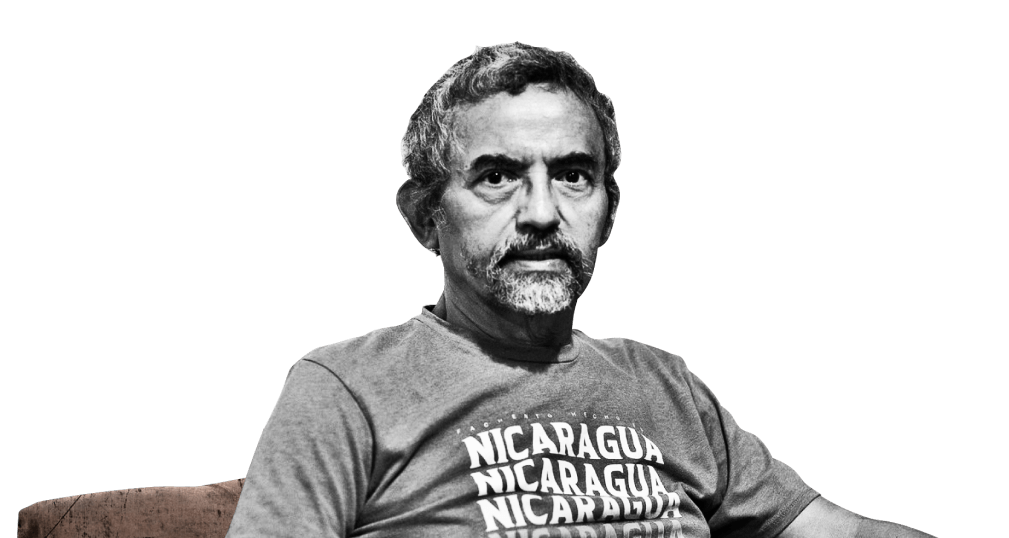

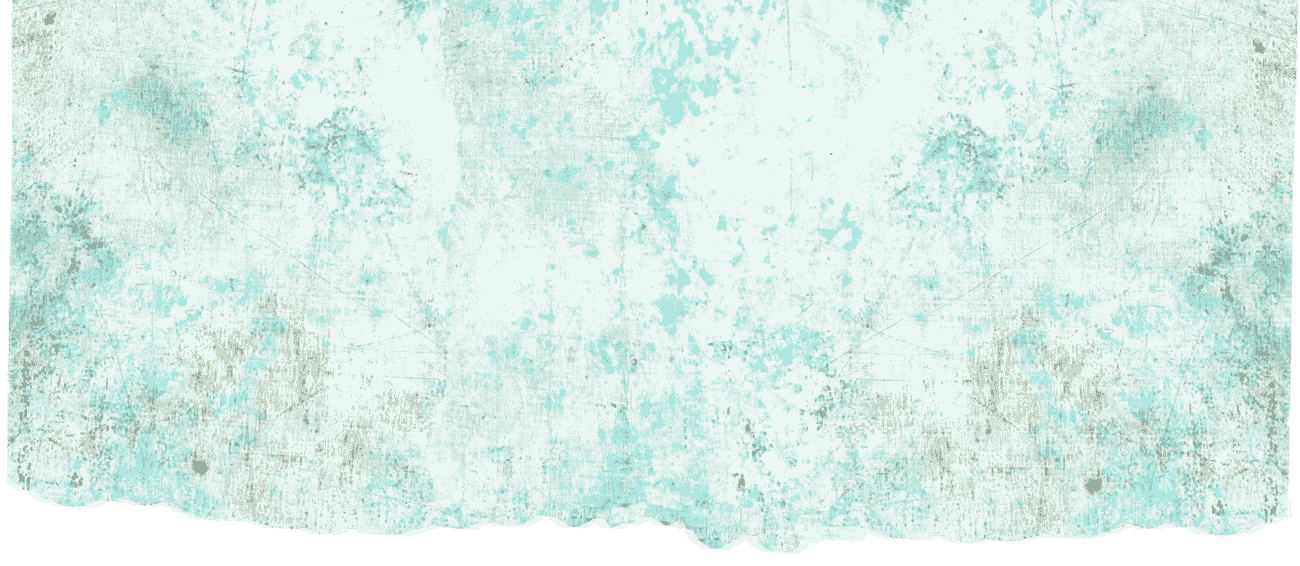
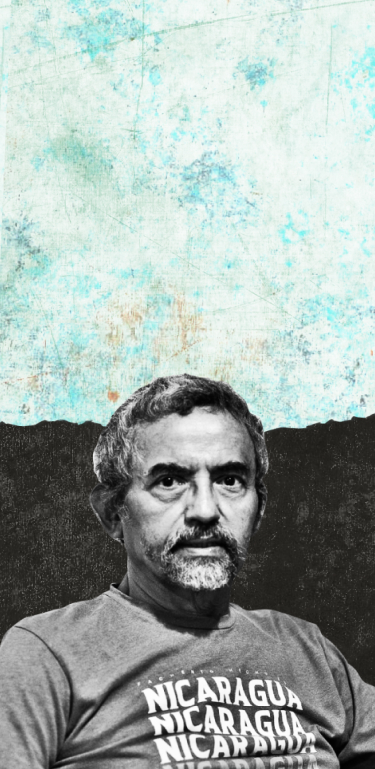

By Wilfredo Miranda Aburto
Photographs by Carlos Herrera
San José, Costa Rica
The life of veteran human rights defender Gonzalo Carrión is facing its most complex hours due to a severe health condition. However, he is not afraid. He stands firm in his convictions, in which the only thing that matters is how to support the victim, whoever they may be. “I don’t have to ask you what party you belong to or what political entity you belong to in order to defend you,” he says, surrounded by the flowers he loves to take care of in his garden in exile in Costa Rica.

Gonzalo Carrión gets off the bus, walks home and smiles to see that the rain falling in San José has relieved the roses and flowers he has planted in pots in his garage (without a car) from the heat. Despite the fact that ten days ago he underwent surgery for a complication derived from the cancer he was diagnosed with in exile, this lawyer does not stop moving, much less doing gardening; taking care of these plants during his already long and eventful recovery.
Gonzalo sees life in his roses and flowers. He describes them as an apprentice botanist who marvels at discovering the origin of species, but perhaps, in his case, all he is discovering is an unprecedented pause in his busy career as a human rights defender since the 1990s. A time for rest. For the first time in his life he is seeing more life than the corpses of victims, the pain of others -which he says has always been his own-, political persecution, his banishment from Nicaragua.
“There is an atmosphere of exile: being away from our home, the separation from family, not hugging those we love, friends, and now this cancer… but I focus on my good mood. It has been key during this illness, because, as a deceased Puerto Rican expert, Frank Suárez, said, cancer feeds on stressed, depressed, and poorly nourished people,” Gonzalo tells me with teary eyes.
He is a personality that seeks and finds encouragement even in adversity itself. “Can you imagine if this cancer had been detected in Nicaragua, under the dictatorship? Oh, dear! Only two things could have happened: they would have settled the score with me, or they would have settled the score with me, but fortunately, it was in Costa Rica. That was a relief.”
Gonzalo bursts into laughter after saying that, a “carrionada,” as he describes his witty remarks. He explains the two ways of settling the score: “Either they would have treated me very well and charged me a lot for the treatment because our rights are seen as favors; I had insurance… or they wouldn’t have treated me and let me die. Either way, the dictatorship would have settled the score with me.”
He laughs again, and an expression of hope appears on his face, thinner due to the illness. The Costa Rican doctors informed him he had cancer on June 23, 2023, the same day Father’s Day is celebrated in Nicaragua. He has yet to overcome the disease.
What Gonzalo Carrión says is not unfounded. He has enough reasons to fear the Ortega-Murillo regime. He went into exile on December 28, 2018, after the National Police accused him of being an “accomplice” in the Carlos Marx neighborhood massacre, a violent episode perpetrated by Sandinista paramilitaries in Managua when four adults and two children were burned alive.
In February 2023, months before learning about the cancer, the government stripped the human rights defender of his Nicaraguan nationality. Then they confiscated his house in Managua, and already undergoing treatment, in January 2024, he received a direct death threat in Costa Rica after opposition figure Joao Maldonado was shot for the second time in San José.
To take time to rest is difficult for Gonzalo. His colleagues at the Human Rights Collective Nicaragua Nunca Más asked him to dedicate himself entirely to his recovery since his health worsened after the first cancer surgery. He reluctantly agreed, but truthfully, disconnecting is very hard for him. He is as aware of the events happening in Nicaragua as he is of his medication schedule. I interviewed him in late May, just ten days after he left the operating room. Before the appointment, I told him we could postpone the interview since the surgery was so recent.
“No,” he told me. “Tell me where I can get by bus, and we’ll talk.” We reached his house after also telling him no and rejecting his proposal to travel on his own by bus. It was the same afternoon that the rain brought a smile to his face. Still, earlier that morning, he had already gone to the hospital by bus, as if going for a six-month check-up. But that’s how this man is, stubborn in his principles, self-sufficient, street-smart. Far from finding a convalescent man, I see the energetic Gonzalo as always, chattering, affectionate, and approachable. With that same old kindness of offering a cup of black coffee right away, as he did in his office at the Nicaraguan Center for Human Rights (Cenidh) in Managua when he was the legal director of that entity, canceled and confiscated by the regime.
For someone with so much energy, used to “defending rights outside the office,” this slower-paced life can be tedious, but Gonzalo is convinced—rather, his surroundings have convinced him—that retirement is necessary at this moment.
He overcomes anxiety by reading literature, poetry; planting roses and other flowers in those pots in the garage; upholding the ideal of defending human rights, life and human dignity as he has always done: pointing “at perpetrators, murderers, and the dictators in plain sight”… A conviction that has always put him in front of many corpses and other people’s pains that, he insists again, have always been his own. Otherwise, he points out, he could not explain his “commitment to seriously defend human rights”.
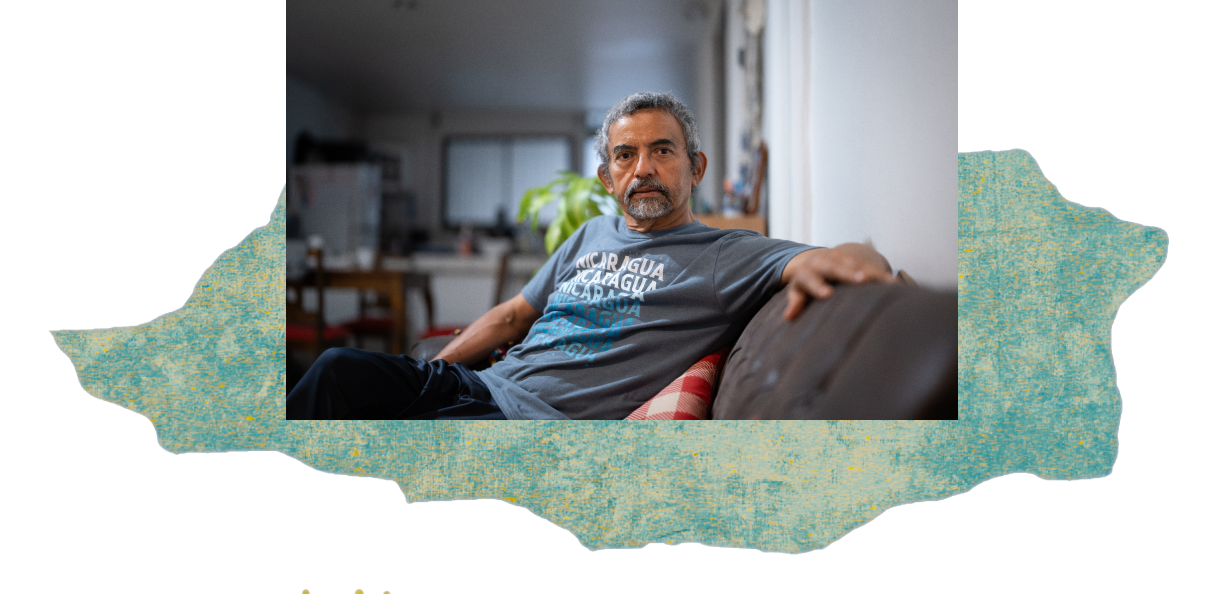
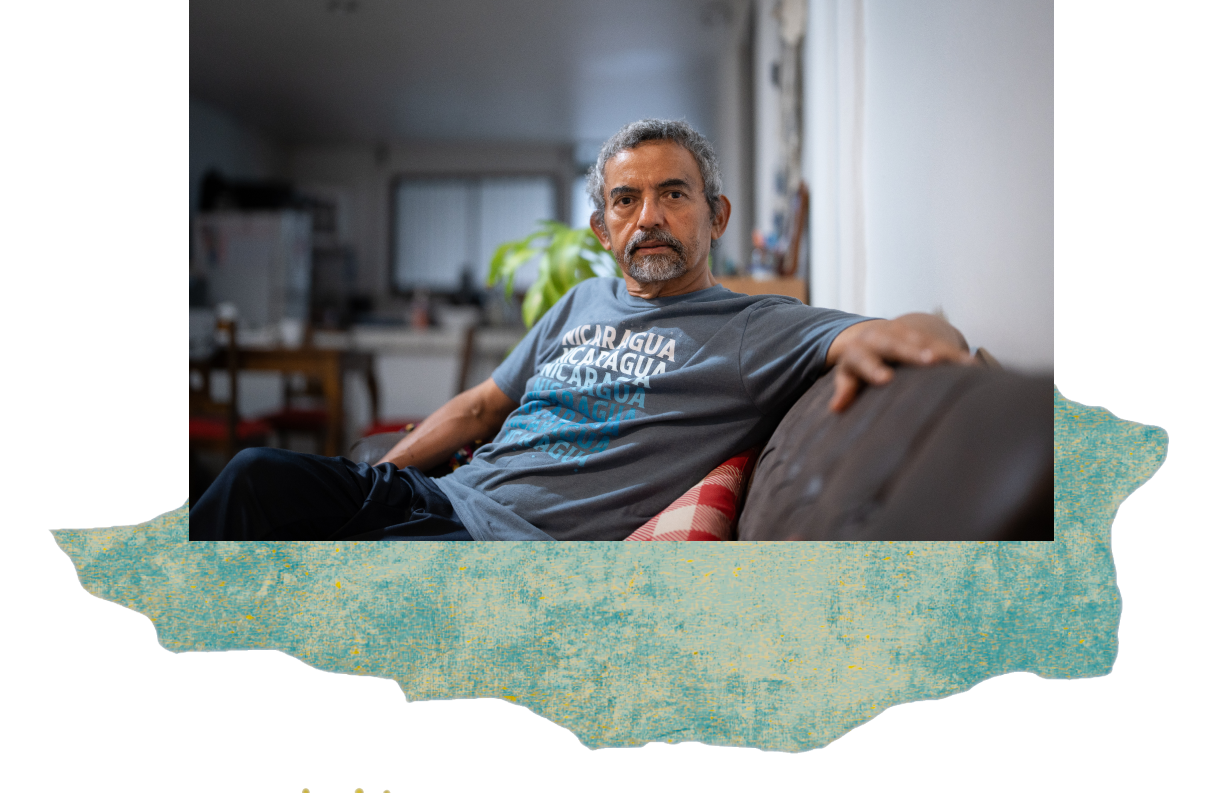
René Carrión López was the name of the first corpse Gonzalo Carrión saw when he was seven years old. He was his first cousin. The lawyer remembers the exact date: October 20, 1967. The National Guard of the Somoza dictatorship killed the young man for being a student and one of the first militants of the Sandinista Front in León.
“They deprived him of his freedom, they tortured him, and I remember he had a bullet wound in his temple. From that day, I understood something about the dictatorship, but I wasn’t fully aware. But I remember my cousin’s wake,” Gonzalo recalls in great detail, remembering not only the dates of the events but also many details of memories that, sometimes due to the passage of time or because they are not crucial, end up being forgotten. But this is not the case with this human rights defender.
(To tell the truth, since I met Gonzalo as a primary source for my journalistic work, I realized that before getting to the heart of the matter, he tends to contextualize everything. He reviews every detail of the stories, the cases. At first, it seemed excessive, but then I understood it was part of his DNA as a defender who documents everything possible. Undoubtedly, a virtue rather than a flaw; a memory that stores facts and situations, and since 2018 has been a very useful tool for documenting crimes against humanity, like the Carlos Marx neighborhood massacre).
Gonzalo talks about his early years so clearly that it seems his childhood was only a few years ago, not decades ago. He was born on January 10, 1961, in the community of Las Gavetas, in San Felipe, in the colonial city of León. He is one of many siblings. His parents had a dozen children, but only eight survived.
“My mother used to say that she had ‘dropped her children’,’ because these were times when miscarriage was not mentioned. I used to tell my mom that if we had been a dozen, everything would have been cheaper. But it was a joke because, even in the best economic conditions, it’s not easy to support eight kids,” he says.
Gonzalo’s parents were workers, and their wages were not enough for “three meals a day.” Thus, the Carrión’s childhood was marked by work. While the future lawyer “learned his abcs” from a booklet taught by an old woman from León, he also worked in the city’s municipal slaughterhouse, butchering pigs with his older brothers. The slaughtering started at night, and young Gonzalo would fall asleep in the classroom in the morning.
“In those extraordinary circumstances, I would say it wasn’t a troubled childhood because it meant a lot to me now, in terms of my relationship with the concept of work. Universally, it is said that children should not work, but should prioritize study, which I support. But my experience wasn’t that: times were precarious, difficult for my family,” Gonzalo says. “I value my parents’ teachings: living with socially acceptable behavior in what we now know as poverty, but poverty with a lot of dignity. Despite the work, they always insisted that we didn’t abandon our studies.”
And so it was. All his siblings graduated from high school, including Gonzalo, who, in his teenage years, worked as a truck assistant, a salesman; for six months, he was a construction worker and, occasionally, worked in the fields cotton picking.
On September 21, 1976, the Carrión family decided to move to Managua in search of better jobs. Gonzalo had just turned 15 and found a capital city still littered with debris from the 1972 earthquake. His first job in Managua was as a truck assistant at a hardware store located in the OPEN-3 neighborhood, later renamed Ciudad Sandino.
Gonzalo used to travel to the north of the country to deliver construction materials, and he remembers that during one of those trips in Matagalpa, there was “a commotion of people.” “The next day, after returning to Managua, a newspaper featured the face of a man I later learned was Carlos Fonseca. At that time, I wasn’t very aware or connected with Sandinismo, but around OPEN-3 and the Satelites de Asososca neighborhood, several Sandinista militants were killed, including Eduardo Contreras. I saw those movements of the National Guard,” Gonzalo narrates.
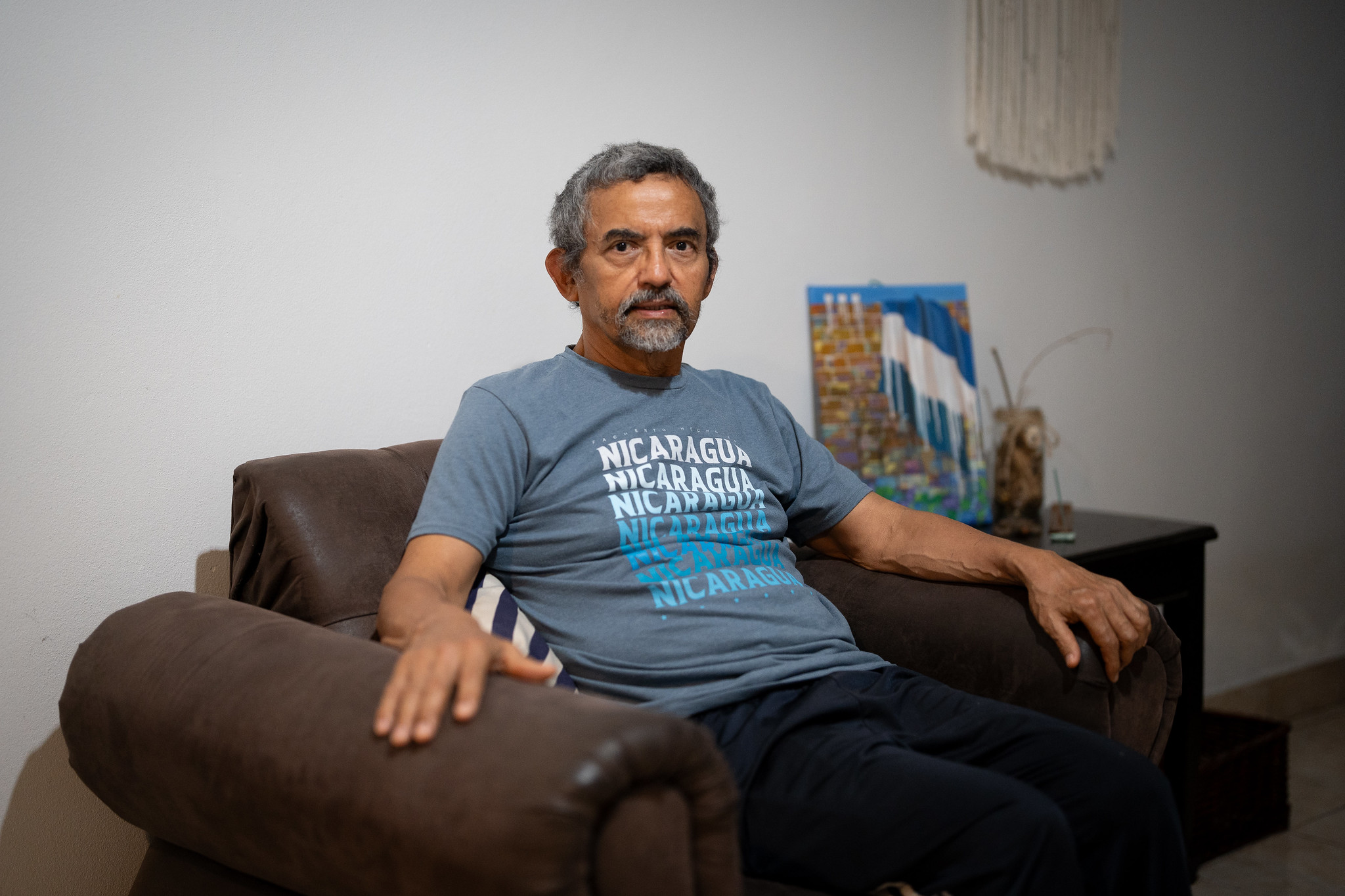
Two years later, Gonzalo changed jobs. He was employed at a distributor located in downtown Managua, in the “earthquake zone,” very close to where the Ministry of Labor is now located. Due to work, on the morning of January 10, 1978, Gonzalo was near the site where Pedro Joaquín Chamorro Cardenal was killed.
“I was 17 years old, and I will never forget the city’s shock, the people’s shock, over Pedro Joaquín’s murder. I had never seen such a large funeral in my life; a mobilization of both repulsion and homage at the same time,” he says. That night, the young man returned to the precarious house where he lived in Managua, near the distributor, and ate the only thing he had: pinolillo.
In the late seventies, with the insurrectional movement in full swing, Gonzalo worked during the day and studied at night. His family found a better house in Las Américas Cuatro, and two of his older brothers became “urban guerrilleros” for Sandinismo. Gonzalo wasn’t a guerrillero, though he admits he set up a couple of barricades in his neighborhood. The guerrilla movement never managed to defeat the National Guard in Managua, so they retreated to Masaya. His parents decided to return to León, where Sandinismo would triumph. They traveled part of the way on foot from Izapa.
Egberto Carrión, the lawyer’s older brother, led a guerrilla command, and Gonzalo remembers an episode that marked him: a crowd wanted to lynch a citizen considered a Somocista, but Egberto Carrión prevented it.
“Later, I found out that person was a close neighbor, and I would run into him on the buses. He only had a wound on his forehead, but he was alive thanks to my brother,” says Gonzalo. That episode awakened his passion for defending others’ lives, for human rights.
The Somocista dictatorship was overthrown in 1979, and the Sandinista Revolution soon called for literacy campaigns. “That’s another indelible memory because there were thousands and thousands of young people mobilized. I had never been away from home for so long. I got to know the mountains, our mighty rivers; the confluence of Río Escondido, the peasants… I think it was a noble cause. Now, it’s analyzed as having political intentions, but during the literacy campaign, I was never indoctrinated, nor did I learn to be a communist. I only remember that rural kids learned to read and later went on to have university degrees. That’s a contribution,” says Gonzalo fearlessly, unafraid of being labeled a “leftist” by far-right sectors in these polarized times. He doesn’t deny his past and is also critical of the revolutionary decade.
After the literacy campaign ended, a group of those who were mobilized were integrated into the Sandinista Youth. They were given the honorary title of founders. Gonzalo held this title but insists that he never founded anything; it was simply imposed on him. “I was part of the Sandinista Youth, a low-level leader, but I was never a criminal against humanity. I didn’t kill anyone! I completed my military service and left unharmed because I didn’t kill anyone. I belong to a sacrificed and crucified generation because many of my contemporaries died, were killed, and that pain was severe for their loved ones,” he reflects.
Gonzalo says that during that time, he began to identify with others’ pain, to share it, to make it his own… In 1990, the Sandinista Revolution lost power at the polls. “When we lost, we felt the revolution was somewhat close, but it was something abstract. They talked to us about ‘the power of the people,’ but really what I learned about commitment is to identify with other people’s pain; to identify with the people’s cause,” he affirms.
“In the revolution, they said we had to ‘storm the heavens,’ the story of the ‘new man,’ but we never touched the sky, nor did we find a ladder big enough to reach it. We were so far from the sky… but those who held real power, those who had the upper hand, not only stole the sky, which was our dream, but they also grabbed everything within reach. The Piñata, like the one they are repeating today.” (Gonzalo speaks with authority: his house in Managua was confiscated several months ago by the Ortega-Murillo dictatorship).

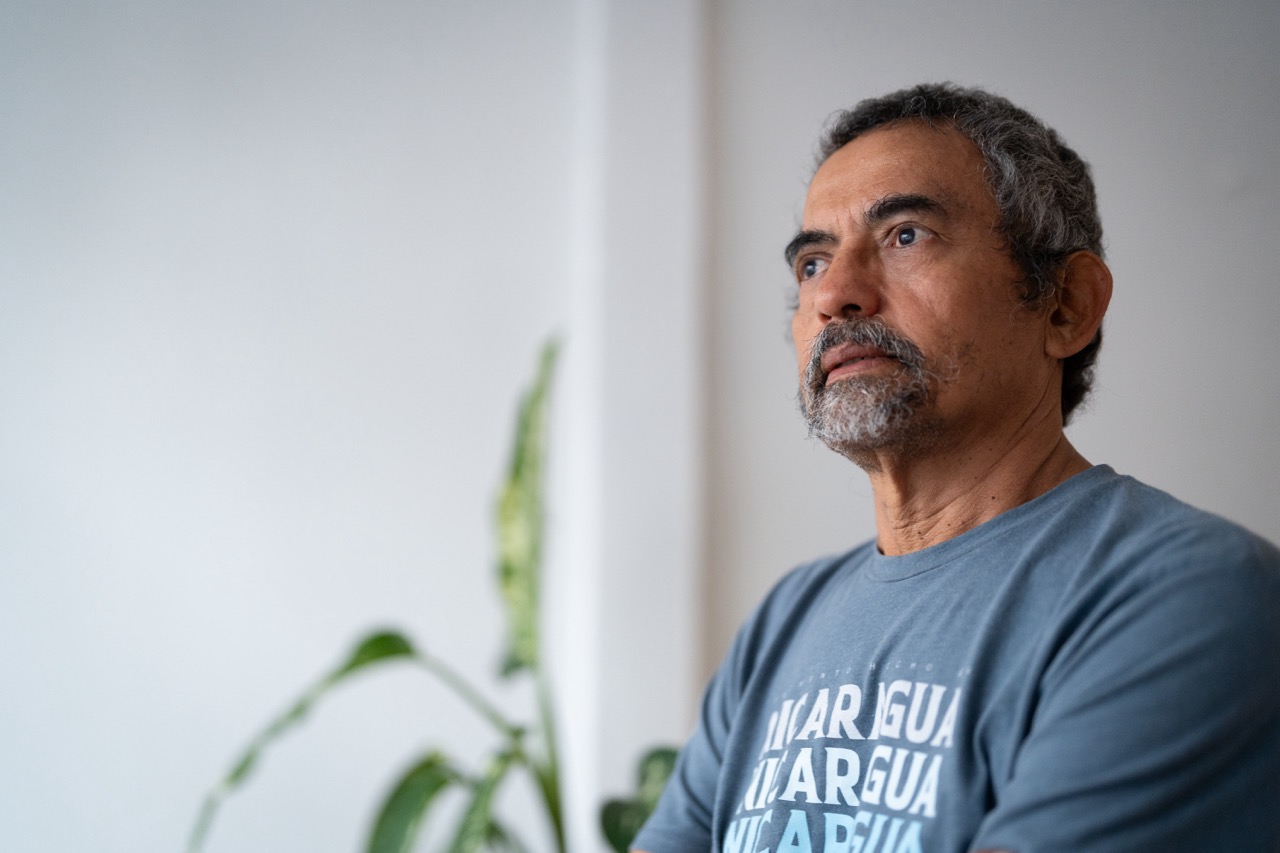
The Sandinista defeat happened when Gonzalo was in his third year of law school at the Central American University (UCA), now confiscated. Besides studying, he became a student leader. “I never wanted to be a government representative like other student leaders linked to Sandinismo. I led by and for the students. We created a movement with two fundamental demands, still relevant today: Autonomy and 6% (of the annual national budget) for the university.”
In 1992, Gonzalo had his first contact with Cenidh. He arrived as an intern, a law student. That same year, an unprecedented student strike occurred: 47 days of protests that ended with a legal and moral victory for the university community, as the Supreme Court of Justice ordered respect for the University Autonomy Law, and the Parliament clarified, in a dramatic vote, the authentic interpretation of that law. It was established that the 6% should be calculated based on the General Budget of Ordinary and Extraordinary Income.
“We celebrated our achievements but also the fact that not a single person died; neither student nor police. I must vindicate it because we led the protest without this eagerness to show arrogance and machismo.,” Gonzalo points out. He completed his three-month internship at Cenidh and graduated as a lawyer in 1993. The Cenidh board invited Gonzalo to be part of the legal team, satisfied with his work as an intern. He accepted but soon left the organization: he won a scholarship to study a master’s degree in public law with a concentration in constitutional law at the Pontifical Catholic University of Chile.
“It helped me specialize and master, let’s say, the conceptual, academic, and theoretical part for the defense of human rights. It was a time when I began to take life more seriously: to read and study. Study and read. To tell you the truth, I didn’t get to know Chile, the end of Patagonia. And there was no money either, so I saved part of the scholarship stipend. That helped me make the down payment on the house I bought with my wife, the same one that the dictatorship has stolen from us,” recounts the human rights defender.
Upon returning from Chile, Cenidh rehired Gonzalo. From 2005, he became the organization’s legal director until 2018, when he had to go into exile in Costa Rica. Since Daniel Ortega returned to power in 2007, Cenidh served as a counterweight to a regime that dismantled institutional integrity. Cenidh was a benchmark in Nicaragua. Its offices were always full of victims of human rights violations. The organization was the refuge of an unprotected citizenry, as state institutions, like the supreme court, were subordinated by the Sandinista leader.
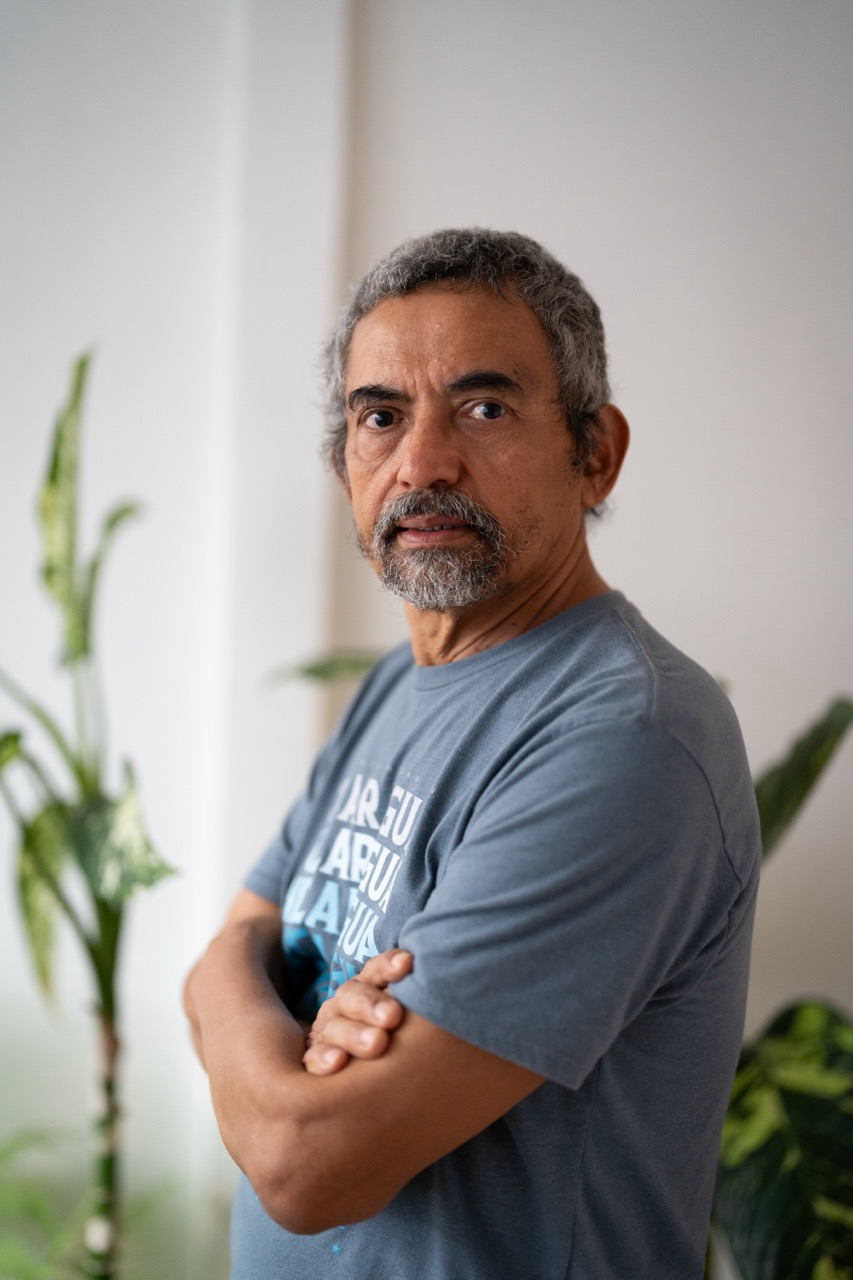
Cenidh, led by Dr. Vilma Núñez de Escorcia, was the first organization to label Ortega’s government as a dictatorship. They criticized constitutional violations, reelection, electoral frauds, but above all, they put into practice the motto that defined them: “a right that is not defended is a right that is lost.”
In 2012, I was a young reporter. I worked at Confidencial, and Cenidh was one of my assigned sources. I saw Gonzalo as an important person since almost every week he was on the front pages of newspapers or on the news, denouncing. Among all the human rights violation cases I covered, I remember one in particular, not only for its impact but also because Gonzalo’s help was crucial in documenting it for my reports.
On August 9 of that year, a 12-year-old disabled girl was walking her dog in El Carmen park, within the security perimeter of Daniel Ortega and Rosario Murillo’s residence, when some police officers, part of the presidential escort, sexually assaulted her. The family turned to Cenidh to denounce it, but there were still some loose ends to investigate. For the first time, Gonzalo turned to me as a reporter, and we managed to document the entire case.
The victim’s father publicly denounced it and the scandal was huge, due to the seriousness of the gang rape and because it awakened an undesirable ghost for the presidential couple: that of sexual abuse once again at their doorstep. Unmistakably, the case recalled the sexual abuse accusation Zoilamérica Ortega Murillo made against her stepfather.
The publications about the rape, carried out 30 meters from the presidential residence, had such an impact that the Ortega-controlled justice system put three police officers on trial. They were found guilty, but far from being satisfied, Gonzalo continued to insist that it was half justice because the victim had identified six police officers. There was impunity, a word that Cenidh lawyers always tried to eradicate from Nicaragua.
“Cenidh is my inevitable school of human rights,” defines Gonzalo. During the 2000s, the lawyer began to document the selective massacres of peasants in the countryside, torture in prisons, police repression in mining areas, and to see more corpses.
For example, the bodies of Irinea Cruz’s husband and children, shot by Sandinista officials in November 2011 in their home, located in the community of El Carrizo, for demanding their identity cards to be able to vote. Or the bodies of Elea Valle’s husband and two children, brutally executed by soldiers of the Nicaraguan Military. Gonzalo documented that massacre: the 16-year-old teenager raped, tortured, and finally hanged from a tree; and the 12-year-old boy dismembered, with his hands cut off.
“When at Cenidh we began to talk about dictatorship, a high-ranking Sandinista official confronted me. He said, ‘Which dictatorship? Where are the political prisoners, the tortured, the disappeared, the executed?’ All of that was happening in the countryside, killing, arbitrarily detaining, and torturing in the old El Chipote. All of that spread around the country starting in 2018,” explains Gonzalo.
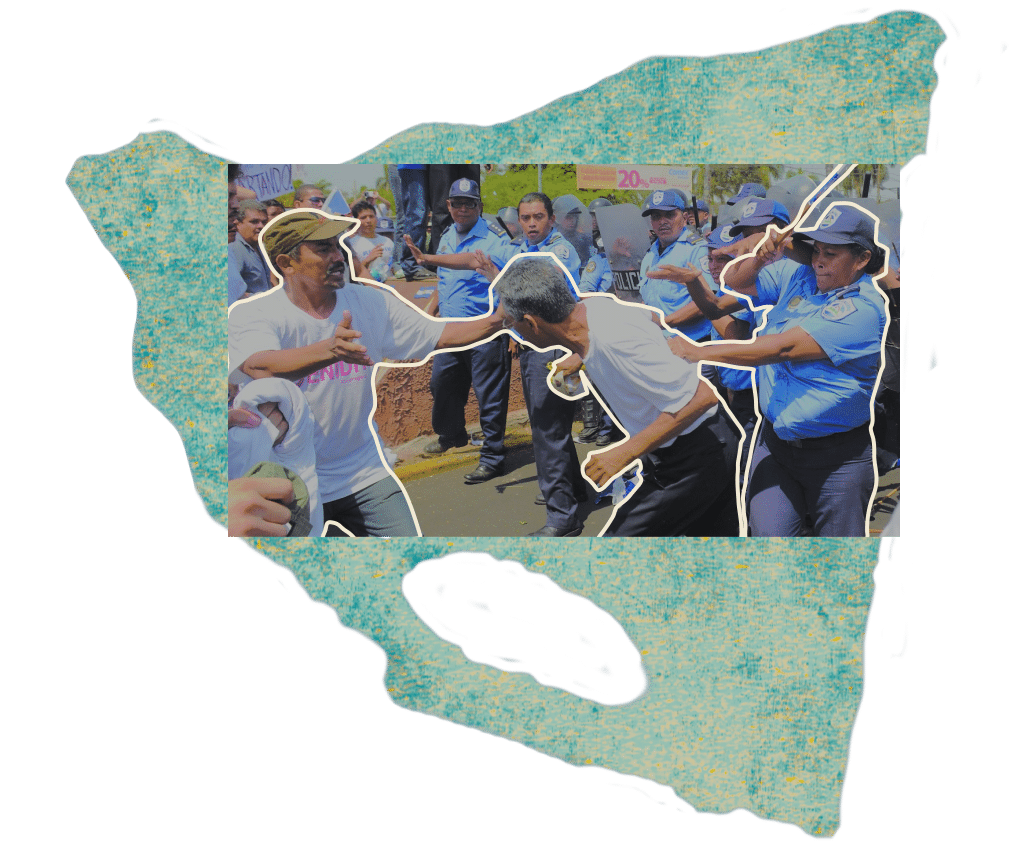
I don’t know how they managed it, but Gonzalo and his Cenidh lawyers were always the first to be at places where human rights violations were reported. After the social protests erupted in 2018 and the regime unleashed unprecedented repression in Nicaragua, Cenidh was filled with complaints like never before in its history. The defenders worked tirelessly, and Gonzalo doesn’t know who leaked his personal number on social media. The post that went viral said something like: “If you want to report a human rights violation, text this number.”
Gonzalo’s phone didn’t stop vibrating until December 2018. “People would call me and say: ‘human rights, human rights, they are shooting at us, they are shooting at us! What do we do?’ There were too many calls, especially at night and early morning, which was when people were most attacked. I could only tell them, paralyzed, to get on the ground because the only ones who could stop that massacre were the evil tyrants,” the lawyer recounts.
Gonzalo managed to get a few hours of sleep on the early morning of June 16, 2018. He was in bed with his wife when, before dawn, his phone was flooded with calls. And with a video that everyone sent him: A woman, crying, screamed that her family had been burned alive by Sandinista paramilitaries. The human rights defender immediately called two of his lawyers, Braulio Abarca and Lulio Salvador Marenco, for an “in situ visit.” It was very difficult for them to reach the Carlos Marx neighborhood because it was a complicated area, very close to the Polytechnic University (Upoli), where there were many barricades to protect against police and paramilitary attacks.
“We don’t have the gift of omnipresence, but we tried as much as we could at Cenidh. To my dismay, we arrived late at the Carlos Marx neighborhood; almost two, three hours later. When we got there, it was a heavy atmosphere: it was full of paramilitaries, but we still stayed to document. The next day we joined the family for the funeral and followed up on the case,” recalls Gonzalo.
The human rights defender continued working throughout 2018, attending marches and places where extrajudicial killings occurred, until late that year, months after the crime in the Carlos Marx neighborhood, the police held a press conference “clarifying” the incident. Gonzalo was accused of being a “cover-up.” At that moment, he knew he had to hide to avoid being captured. He spent a few days in a safe house in Managua until he had to come to terms with two words that “shocked” him, reminiscent of a bygone era: clandestinity and exile.
His destination for exile was Costa Rica, but for security reasons, he had to flee Nicaragua through Honduras, via a border trail that led to a mountain, which in turn led to a coffee plantation. Gonzalo dressed as a peasant to avoid raising suspicion at the northern border.
Gonzalo took a flight from Tegucigalpa to San José days after stopping in Honduras. In Costa Rica, he got depressed. “I wasn’t okay when I arrived because, regardless of the fact that some people have suffered more than I have in exile, we all have something in common: not being in our home, Nicaragua; the separation… This is an attack on our dignity, against our identity as individuals and families. The dictatorship has attacked the life project of the majority of the people,” reflects Gonzalo.
Thanks to his family and books, he was able to overcome depression, but also thanks to his fellow human rights defenders. They decided to found the Human Rights Collective Nicaragua Nunca Más in a context of totalitarianism and exile. The regime had not only closed Cenidh but all human rights organizations in the country. Braulio Abarca, a young lawyer, says he did not hesitate to join in founding the Collective and recognize Gonzalo’s leadership.
“I met Gonzalo in 2012 when I joined the Cenidh defense area as an intern. In the first interview we had, he asked me this question: for the people, what are human rights? And I tried to give him an academic answer, framed in the topic of international conventions and the Constitution. Other colleagues who were there as interns did the same, and we didn’t really hit the mark… until at some point he said: no, for the people, for the victims, human rights are this institution, they are Cenidh, clearly alluding to the fact that people didn’t know they had human rights,” recalls Abarca.
“Then, at that moment, I understood that the victims are the heart of the organizations, so attending to these people who came looking for answers, legal processes, family law issues, labor rights, as well as taking cases internationally to the Inter-American Commission or mentioning these cases in various Universal Periodic Reviews or United Nations Mechanisms.”
Abarca and Gonzalo spent New Year’s 2018 exiled in Costa Rica. In the following months, the Collective was born, an organization that is today an international reference in defending human rights in Nicaragua and in exile. That defense personally cost Gonzalo the loss of his Nicaraguan nationality in February 2023 and the confiscation of his home.
“Perhaps we are in this mess and were robbed of our rights for taking this commitment seriously. Seriously defending human rights is about seeking and telling the truth. That was the Cenidh school for me, and that’s why I tell the young people at the Collective that when we are told about an incident, we must go to the place, in situ. When someone is a true human rights defender, they take these risks. They must have empathy and identify with the victim, regardless of who they are,” says Gonzalo, summarizing his philosophy of defending rights.
“I don’t need to ask you which party you belong to or which political entity you are from to defend you. If you tell me about an abuse of power that violates your human rights, I will support you if you allow me. And if you trust me by telling me your story, I will represent you. That’s why from the first day I do this, I have not defended human rights with a hood on my face. I do it in plain sight.”
That conviction has somewhat worried his family, but Gonzalo assures that despite their justified fears, his wife and daughters support him. “My life has been committed, and I’ve shared it with my wife because she was forced to leave the country. With my daughters, we share a complete life project because obviously, each one has their own identity. But we share the same project in the sense of the legitimate ideal that we will achieve freedom and therefore pay the sacrifice,” says the lawyer.
His cancer announcement was a bitter surprise for the Collective and the family, but they managed to gather strength to encourage Gonzalo. In his spare time, the defender’s family formed a book club to exchange readings. In all those people and those little things in life that Serrat sings about is where Gonzalo Carrión’s hope resides, the hope of returning to his homeland.
“Dictatorships are not invincible, and I have full confidence, ‘paratuqueando’ Pablo Neruda to avoid saying paraphrasing, I know that I will walk again on the streets of what were our blood-stained cities of Nicaragua, and I will stop to cry in the squares for those missing. It may sound very pretentious, but I envision a life in freedom,” concludes Gonzalo.
DEFENDERS is a multimedia series produced by DIVERGENTES.
Text by Wilfredo Miranda Aburto

